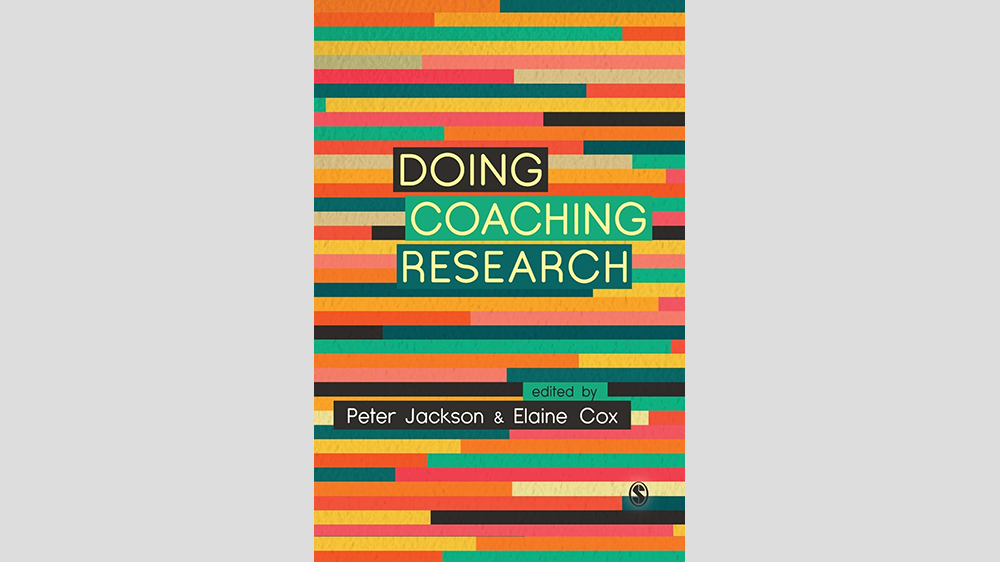
Authors: Peter Jackson & Elaine Cox
Reviewers: Sally Twisleton & Carole Whyley
The main objective of the book is to give an overview of research approaches with a specific focus of how these apply in the field of coaching. It is intended to make research accessible to as many practitioners as possible. I think it does a very good job of this. It is quick and easy to read and allowed me to gain a good overall appreciation of research philosophy, different approaches and the challenges or benefits of each when researching coaching. The book is equally applicable to research in mentoring and supervision in my opinion.
This book would be ideal for someone starting out on a research project for the first time and wanting to inform themselves of the options they have on methodology to pursue and to help them think about the justification for their choices. Each chapter then helpfully signposts further reading to allow more in depth study on a particular topic which I think would be needed to understand a topic in more depth.
Although I think this is a more introductory text than some of the more heavy research textbooks it does give some very helpful insights about research in the field of coaching and I particularly liked the worked examples they included to act as case studies to bring the theory to life. For me, it helped me to think about my role as a researcher and my personal impact or influence on the research I am doing.
Although the book is aimed at students studying for Masters and Doctorates it is a useful resource for any practitioner researcher to overcome the particular challenges of doing research projects in the complex and multi-disciplinary field of coaching. It aims to cover the underpinning theories, philosophies and foundations of research, different methodologies and approaches and also the impact, dissemination and claims research can make.
My favourite part was the inclusion of real examples and the challenges associated with them. The part that made me most curious was the reason for the book as a whole which was how can coaching research be tackled in a way that can overcome key criticisms in doing research in this particular context and also that can make valid claims that can inform and lead development in the profession.
The book is organised into a series of well structured chapters meaning you can either read the whole thing or easily dip into the areas of interest. I liked the way the chapters were structured and broken up to make them easy to read. Some chapters included discussion points to encourage the reader to reflect and all chapters signposted references for further study.
The book is an edited collection of chapters by different researchers/coaching practitioners all of whom are active researchers and most of whom have roles in academia. Having recognised experts in their field contributing chapters was excellent and gave the book credibility and demonstrated practical relevance to our field.
Reading the book helped me to revisit the quite complicated subject of research philosophy and confirm my position for the piece of research I am doing at present. It explained the terms well and helped me to gain more clarity. It also gave me some new insights about approaching interviews and how to approach and structure the data from these.
I think the book flows and is well structured and tackles head on the difficult topics, issues and criticisms of research in this field. It feels accurate, current, well thought out and considered. Reflection and learning is encouraged and embedded into the book, sources are credible and information is accurate.
The ‘theoretical foundations of research’ chapter is really helpful for gaining increased clarity and insight into research vocabulary, philosophies, theories and paradigms and the overlaps there are that make the whole subject confusing and the different claims that are made. My understanding has increased but this is a book I will need to re-read and keep referring to.
Overall this book has been a great addition to my current reading on research. It provides a handy guide which I have been able to dip into on specific topics and also find further references to dig into my chosen methodologies. It is not as over facing as many books on research and feels very accessible. It is also great to have a research book specifically targeted at coaching rather than a more general business or organisational research methods book.
I would say this book would be really useful for anyone wanting to undertake any research but is essential for anyone wanting to undertake coaching research as it really is written in a way that takes into account this particular context.
I feel more informed about research methodology as a result of reading this book.
I will continue to use this book to support me to undertake my own research project.